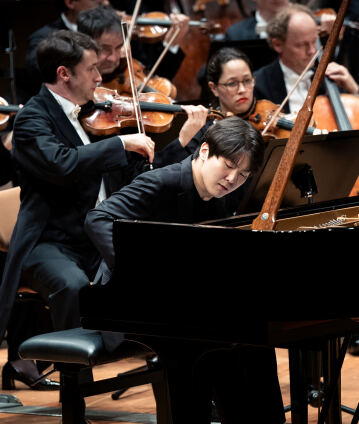Paavo Järvi and Seong-Jin Cho

Seong-Jin Cho, 2024/25 Artist in Residence, is considered a poet at the piano and, by his own admission, also has a penchant for black humour. This is reflected not least in the work he has chosen for this programme, Shostakovich’s Concerto for Piano and Trumpet which brilliantly parodies the genre of the piano concerto. In contrast to this is Anton Bruckner’s First Symphony with its spiritual solemnity. Paavo Järvi opens the evening with an overture by Veljo Tormis.
“After listening to a musical work, I don’t want to be who I was before”, said Dmitri Shostakovich, “I have to absorb the work, live through it, discover something for myself in it”. Listening to his Concerto for Piano, Trumpet and String Orchestra is a fast-paced emotional roller-coaster ride: in the first movement, opulent, almost nostalgic themes are randomly interrupted by military marches and banal music hall rhythms. The 26-year-old Shostakovich quoted wittily from the repertoire in this “distinctive and indestructible work” (Robert Matthew-Walker): there are melodies taken from Beethoven, Mahler and Haydn as well as echoes of English and Austrian folk songs. Virtuosic piano technique and an enormous wealth of musical ideas culminate in an entertaining pastiche of the genre that cleverly subverts the listener’s expectations.
Orchestra member Guillaume Jehl has already played the solo trumpet part in a concert produced exclusively for the Digital Concert Hall during the coronavirus pandemic. His close connection to Seong-Jin Cho gave rise to the idea of performing the double concerto again as part of Cho’s residency.
When Anton Bruckner completed his spirited First (officially counted) Symphony, he was over 40 years of age. Despite the respectable success of the premiere in 1868, he would not be recognised as a symphonist for almost another two decades. Only then did his First Symphony come to attention again. Bruckner would continue to work on most of his symphonies after they were completed – usually under the pressure of success and on the advice of his friends. Consequently, a second version of the First was produced in 1891. Paavo Järvi, a long-standing artistic partner of the Berliner Philharmoniker, presents the work in its original version, which is generally regarded as more lively. The programme begins with an explosive overture by Järvi’s compatriot Veljo Tormis, who is considered one of the leading Estonian composers of the 20th century.
© 2024 Berlin Phil Media GmbH
Related interview